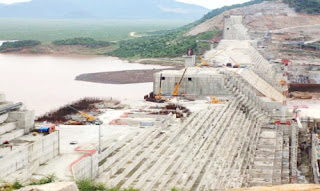Ethiopia Says to Continue With Plans to Fill Nile Dam
Ethiopia has said it will continue with its plans to fill its $4 billion Grand Ethiopian Renaissance Dam (GERD) from July, despite Egypt's claim that the move could be lead to regional instability.
In a letter to the UN Security Council on Monday, Ethiopia's Foreign Affairs Minister Gedu Andargachew said that Addis Ababa "does not have legal obligation" to seek Egypt's approval to fill GERD.
Gedu was responding to Egypt's recent complaint to UNSC in which Cairo sought the intervention of the UN executive body to stop Ethiopia's plan to start filling what would be Africa's largest power dam.
Egypt said Ethiopia's move to fill the dam before reaching a final agreement with riparian states "potentially poses a serious threat to peace and security throughout the region".
"This [filling the dam] would jeopardise the water security, food security and indeed the very existence of over 100 million Egyptians who are entirely dependent on the resource of the Nile River for their livelihoods," Egyptian Foreign Minister Sameh Shoukry said in a 17-page complaint document to UNSC dated May 1.
Ethiopia and Egypt have failed to agree on the filling period with both countries accusing each other of being stiff in their conditions.
On April 10, Ethiopian Prime Minister Abiy Ahmed proposed a "first stage filling" strategy that would allow GERD reservoir to retain 18.4 billion cubic meters of water over a two-year period.
However, both Egypt and Sudan fear the reservoir, with a holding capacity of 74 billion cubic meters, will affect their water share from the Nile River.
Addis had initially planned to fill the dam in three years but it lengthened the period to between six and seven years. However, Egypt's proposal has always been the dam to be filled in 15 years in order to avoid detrimental impact downstream.
Now Ethiopia says all necessary preparations for the first filling of the dam have been completed.
"This storage is meant to begin testing of the power plant, effectively releasing the water downstream. Furthermore, the impoundment is carried out in two years with 4.9 billion cubic meters of water in the first year and 13.5 [billion] cubic meters of water in the second year," Gedu said.
"Moreover, the rules for first stage filling are not the creation of Ethiopia; rather, they are taken from the non-controversial sections of the entire 'guidelines and rules' worked out by the three countries."
"Therefore, Ethiopia is in full compliance with the DoP [Declaration of Principles] and made a remarkable and generous gesture in offering an agreement to Egypt," Gedu argued.
Ethiopia pulled out of the US-led talks on the Nile dam accusing the US and the World Bank of overstepping their observer roles and favouring Egypt's interest.
A negotiator in the talks Zerihun Abebe on Tuesday said he was surprised at Egypt lodging a complaint to UNSC accusing Addis Ababa of "unilateralism".
"Ethiopia has a sovereign right to fill the dam constructed within its borders and through local funding," Abebe was quoted as saying by Turkish news agency Anadolu.
"Ethiopia invited both Egypt and Sudan and shared details about the GERD in 2012 and kick-starting a process of trilateral talks. And that was based on Ethiopia's firm stand on the principle of cooperation, regional partnership and to find a win-win solution," added Abebe.
GERD, funded by the US and the World Bank, is expected to produce over 6,000 megawatts once upon completion.
Source: All African




Comments
Post a Comment